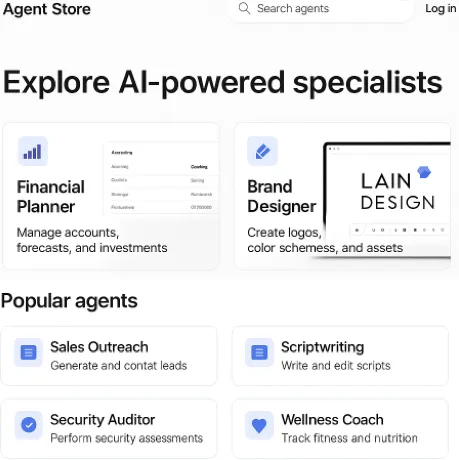
The AI Agent Store
The Agent Store: A Marketplace for AI-Powered Specialists
Technology • AI • Systems
Here’s a structured article on a theoretical AI Agent Store concept, written as if it’s emerging in the very near future. I’ve grounded it in real AI trends and plausible technological developments.
⸻
Introduction: The Dawn of Agent Commerce
Within the next few years, the way we discover, hire, and deploy software will shift from downloading discrete apps to acquiring autonomous agents—AI-powered entities capable of understanding goals, executing multi-step processes, and adapting to feedback without constant human input.
The Agent Store will be the central marketplace for these entities, operating much like today’s App Stores, but for intelligent, self-directed systems.
⸻
What Is an AI Agent Store?
The Agent Store would function as a curated ecosystem where individuals and businesses can browse, purchase, subscribe to, and deploy AI agents with specialized capabilities. Unlike traditional software:
Agents are proactive: They don’t just respond—they initiate actions, monitor progress, and adapt strategies in real time.
Persistent memory: They retain context across sessions, meaning they learn from each interaction.
Interoperability: Agents can communicate and collaborate with other agents, forming multi-agent teams tailored to complex workflows.
⸻
Example Categories of Agents
1. Business and Operations
Financial Planner AI: Monitors accounts, predicts cash flow, and suggests tax optimizations.
Sales Outreach AI: Identifies leads, drafts personalized outreach, and books calls.
2. Creative and Media
Brand Designer AI: Generates full brand kits, website themes, and social content calendars.
Scriptwriting AI: Drafts, edits, and formats scripts for YouTube or podcasts.
3. Technical and Development
Code Refactoring AI: Reads entire repositories, optimizes for performance, and updates documentation.
Security Auditor AI: Continuously scans systems for vulnerabilities and patches them.
4. Personal Life
Life Organizer AI: Manages schedules, travel planning, and long-term habit tracking.
Wellness Coach AI: Monitors diet, exercise, and stress markers through wearable integrations.
⸻
The Architecture Behind the Store
The Agent Store would rely on three core layers:
Base Models – Large Language Models (LLMs) and multimodal models (e.g., GPT-5, Claude, Gemini, Mistral) providing reasoning and language capabilities.
Specialization Modules – Fine-tuned models, prompt engineering templates, and domain-specific APIs that give agents their “skills.”
Execution Layer – Secure sandboxes and integrations with tools like Google Workspace, Slack, GitHub, Notion, CRMs, and IoT devices.
⸻
How Agents Would Be Sold
One-Time Purchase: Buy an agent and host it yourself.
Subscription: Pay monthly for cloud-hosted, continuously updated agents.
Usage-Based Pricing: Pay per task completed or per API call.
Revenue Sharing: Agents that produce revenue (e.g., e-commerce automation) share profits with the developer.
⸻
Trust, Security, and Ethics
For widespread adoption, the Agent Store must build trust:
Verification Badges for vetted developers.
Transparent Capability Profiles that clearly list what data agents can access and how they use it.
Sandboxing to prevent unauthorized access to local files or external systems.
Ethical Standards to avoid malicious automation like fraud, spam, or manipulation.
⸻
Why It’s Inevitable
Three converging trends make an Agent Store in the near future almost certain:
Maturity of LLM APIs – Models are now capable of multi-step reasoning and tool use without constant prompting.
Proliferation of Agent Frameworks – Platforms like LangChain, CrewAI, and AutoGen make building agents easier.
Consumer Expectation Shift – Users increasingly expect software to act as a partner, not just a tool.
⸻
A Glimpse Into the Near Future
Picture logging into the Agent Store in 2027:
You search for “E-commerce Growth Team” and find a bundle:
1 × Marketing Strategist Agent,
1 × Ad Creative Generator,
1 × Customer Support Rep.You click “Deploy,” and within minutes these agents begin working together:
The strategist plans campaigns, the creative agent designs assets, and the support agent monitors customer tickets.
You’re not hiring people. You’re assembling autonomous talent.
⸻
Conclusion
The Agent Store represents a natural evolution of the digital economy—from static software to intelligent collaborators. In the near future, agents won’t just run in the background; they’ll run the workflows, manage the systems, and, in many cases, create the work themselves.
The question isn’t whether an Agent Store will emerge—it’s how quickly we’ll be ready to trust them with our world.
⸻
